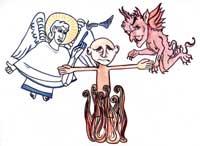self-esteem
What is self-esteem?
You may have heard the word self-esteem many times, but what exactly does it mean? Self-esteem is to love oneself: having little self-esteem is, therefore, to love one's self little and to have a lot of self-esteem is to love oneself.
Self-esteem and self-concept
Self-concept is intimately related to self-esteem and represents the concept of self. It constitutes the knowledge we have of ourselves and therefore has an important error: in no case is it objective.
The concept we have of ourselves is very much related to what we want. If the concept we have of us is good, we love ourselves more and if it is bad, less. Ultimately, self-esteem will explain our attitude towards ourselves and many things about our affective life and behavior.

If you ask yourself if you prefer to have little, much, or moderate self-esteem, you're sure to answer me to the extent, right? Love us a lot in our society because it is confused with pride. And if you ask: What is better to love your parents, many, few or to the extent? love friends, much, little or to the extent? This time you will answer me to the best want a lot, considering that loving parents a lot is not giving everything that parents want or that loving friends a lot is not saying no. So why not want as much as we want ourselves, our parents, our children or our friends?
Self-esteem and mental health
According to studies, having little self-esteem is related to psychic pain. People with low self-esteem tend to suffer more anxiety, depression and psychosomatic diseases and interpersonal relationships are scarcer and worse.
The one who feels little is more afraid and with fear of what others do not accept is self-insulating. In order not to guess “what little is worth” the others, he lives in disguise and, before any criticism, fearful of what is going to be patent, he is very meticulous. His most important goal is for others to accept him (which he is not able to do with himself). “To give pleasure to others”, in the confidence that this will achieve the love of others, mortgage all its character. Without realizing it is a "tranposo something": “always thinking of others”, but in exchange for the prize (that is, of love). It depends on the acceptance of others.
It does not take into account that being fantastic for everyone is impossible or that not everyone loves us. In any case, this attitude is understandable because it requires much affection, it is like an excavated boat that will never overflow, insatiable (Figure 1). How to enjoy the love of others and how to love others healthily if you are not able to love yourself?
Before moving forward, however, we must distinguish between believing that in a specific area we are few things and another feeling like people and totally few things:
- It happens to all of us that in some areas we take for granted. On many occasions, this is only true. In this case we can adopt two types of attitudes:- On the one hand, knowing and accepting our limitations. This attitude is realistic and healthy.- On the other hand, do not accept our limitations and use against us all the mistakes that reality offers us. This will make us worse and regret the difficulty of recognizing that we are as we are. There is no doubt that this second position is the opposite and does not suppose anything good.
- In the second group are those who consider themselves totally little and rejected. They throughout their lives have only learned that. They have been mistreated and rejected and have fully internalized this dynamic. These people need the help of specialists who are sick.

Dimensions of self-concept
We can divide our knowledge of ourselves into three areas. As we have body, we are desire and we live in society, we must distinguish between physical self-concept, psychological self-concept and social self-concept
Although they do not coincide point by point with the characteristics that are valued in society in general, they have a great influence on our tastes. As we grow and educate in a culture and a society, this has a great influence on our values and aspirations. You will agree with me that being a reader, as our present society demands, is excessive, impossible (Figure 2). The characteristics that we should have human beings are excessive. This can be understood, to some extent, the disregard suffered by the elderly in our society, the discontent of the unemployed or the complexes related to physical appearance.
Due to their excessive characteristics, all have as mission “to descend”. The permanence or exclusion of these ideas in our society is in our hands and we should try to change them. However, in these pages I prefer to talk about what we can do for ourselves: our tranquility and happiness cannot wait to change society.
How is self-concept built?

In childhood we built the self-concept with information from outside. Quite general and related to valuation. It’s limited to things like “my mother says I’m bad.” The punishment and the worst that can endure (not feel loved) are explained to the child and thus internalizes them.
Although “custom” has been internalized to value in a way what one sees and sees in a different way, when taught to see and value things differently from outside, that “custom” can change, just as white skins can be blackened when changing residence. That is the basis of psychotherapy or some relationships so beneficial to our confidence and self-esteem (good friends, couples, etc. ). However, we often relate to people of our own ideology or nature in the choice of our relationships and choose those that reinforce “bad habits” already acquired. This opposes openness and health benefits flexibility. Those who demand much can take as their motto brides, boyfriends or friends of little need and can talk of a person as demanding as she, reinforcing their hardness.
From adolescence, our self-concept comes from others, but we acquire the ability to ask ourselves. Instead of seeing ourselves as empty beings and learning to value ourselves, we often depend on the imperative “should be”. The teenager, in search of identity, sees and equates his characteristics both with the people around him and with the “demanding models” that society has put. This, again, can lead you to analyze yourself harshly and create disgust.
The dynamics of maturity remain the same and is what you have achieved until then. Finally, if you have been hard on yourself throughout your life during your old age, you will tend to continue with that attitude and retirement, illness or loss of faculties can be unsustainable until they take away all the value.
The influence of culture is clearly manifested, but we must not forget that each one is the one who has internalized this “bad habit” and that each one is the one who judges hard. Consequently, one is the only one who can face this judge.
How to improve our self-esteem
It is possible that from the beginning of the article is waiting for this end. Remember what you said before: it is not the same to have little self-esteem in some areas than to want very little. If you think you're second, I would recommend that you seek specialized help. In any case, the following recommendations will also help you. But if you are one of the others, I fear you will not decline. In these lines there is no magic.
Knowing and accepting limits

Even if you are an adult, don't forget to have a baby inside. Discover your child, your nephew, or a nearby child. Even when he is “in evil” you laugh. Their limited capabilities lead to clumsy actions. That awakens you passion and love: “sick,” you think. Why don't you look like that child? Whenever you are wrong, why act hard on yourself and consider it guilty? Don’t you realize that you are largely “child”? It is very important to accept how we are to love us. Trying to correct our mistakes is not bad, but knowing and accepting limitations is also necessary.
Confronting the internal judge
Since within us there is a “child,” there is a “judge.” The judges of all do not play the same thing, that of some is harder and that of others softer
When we see that someone is making mistakes, we become their protector: “Don’t you realize it can’t?” we say. So why don't we protect ourselves if the judge is a tyrant? As we are able to control the desires and desires of the devil within us (“the child”), we are able to face our favor to the “judge” (the angel) because those struggles occur within us. First we have to be able to hear and identify the voice of the “judge.” If their demands are excessive for our limitations and needs, we must learn to defend ourselves: “Hey tyrant! I can't. Don't you realize that what you ask me is too much? that I do everything I can?” We must not forget that we must fight to change this inertia. Habits of many years do not change from day to day and all changes are difficult. Therefore, keep calm and firmness. Courage!





